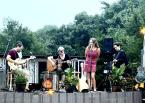After dusk on July 24, I ran up Look street in a downpour, searching for the party. I knew I had found the right place when I saw the ubiquitous Vineyard white-painted wooden parking sign — the one that usually reads “Reserved for: Norton” but read instead, “Reserved for: Rabbi.” I was coming to hear Alicia Svigals and the Klezmer Fiddle Express perform at the Martha’s Vineyard Hebrew Center in Vineyard Haven.
Klezmer is a Yiddish musical tradition developed over the centuries by Jews in Eastern Europe. The form, which encourages dancing and emphasizes melody, declined in popularity following the mass Jewish emigration beginning in the 1800s. In the latter half of the 20th century, American Jews in search of their roots sought to revive the klezmer tradition. Alicia Svigals is one of those revivalists, and she is billed as the world’s foremost klezmer fiddler, having played with artists from Itzhak Perlman to Led Zeppelin.
Earlier this year, Ms. Svigals was schmoozing at playwright Tony Kushner’s flat in Manhattan where she met Rabbi Caryn Broitman of the Hebrew Center, who insisted she come play a show on the Vineyard. The synagogue “wined and dined” Ms. Svigals, in her words, and she felt at home during her first trip to the Island.
Ms. Svigals entered in a floor-length red dress with matching red eyeglasses and a shock of frizzy pewter hair. She began the show by nearly attacking her all-male backing band with her outstretched right hand, cuing a dramatic swell. A fiery performer and a virtuosic violinist, she bared her teeth on wailing glissandos, channeling the bleeding of mermaids, or ambulances of light racing the dead to Heaven. Each band member took turns soloing — even the drummer — but the floor always came back to the frontwoman.
At one point she introduced “the world’s only bar mitzvah song,” written years ago by a New York songstress for her nephew, Benjamin. When Ms. Svigals’ electrical connection began to buzz crankily, she laughed it off — “Oh, I’m getting a transmission. It’s from Benjamin. He says, ‘I’m 43 years old, stop singing about my bar mitzvah!’” When she sang for the first time, about five songs into the set, she released a rich, expressive alto. Adept at keeping a tune, she was equally content to let it go.
When the band wasn’t playing hush-hush behind Ms. Svigals’ keening laments, they perked up for a couple of Gypsy-like stomps in cut time — perfect dancing music. I thought about jumping onto the empty floor and inviting an elderly woman to join me for a freylekh but chickened out. Was everyone else in the audience as shy?
But we were all redeemed when Ms. Svigals ordered the audience onto the floor for a putsch. Following her directions, young and old linked hands and spun in concentric circles, clapping and stomping on cue. I turned to the woman whose left hand I had been gripping for the past five minutes. “Have you ever putsched before?” I asked. “It’s my first time . . . so don’t follow me!” she replied, grinning. “Oh, but it appears I have to follow you!” I winked, as we spun faster in her direction.
In the absence of scheduled guest vocalist Rosalie Gerut, who had suffered a minor but disabling injury, Rabbi Broitman gamely took the microphone for the traditional Yiddish folk tune Shnirele Perele, and an audience sing-along ensued. There was a wonderful sense of community as the lyrics reminded us we were all brothers and sisters. Audience members looked around the room, caught each other’s eyes, and smiled.
The concert felt like a unique cross between a bas mitzvah, a rock concert, and an orchestra recital. In the audience were many Hebrew Center members and a number of unaffiliated music fans. The sole disappointments were that the house lights stayed on all night, and that nobody stood up to dance sooner.
“Alicia was so good, I bought both of her CDs!” gushed Susan Gomez, co-chair of the Hebrew Center’s programming committee. Ms. Gomez organizes fundraisers and events for the center, and she helped its president Joan Borkow organize this concert.
“We usually have speaker events. This was our first real concert since I’ve been here,” explained Ms. Gomez, whose experience at the center began in 2005. “We have had musical events in the past, but their purpose was to enhance religious services.” She said that following the klezmer success, her committee will consider staging concerts more often.
Barb Harrison, a Virginia native living in Katama, also enjoyed the show. “I’ve been listening to klezmer for years — don’t ask me how many,” she said. “It’s so joyous and communal. One time I saw a klezmer version of The Nutcracker that was pretty incredible.”






Comments
Comment policy »